INTERNACIONAL
Monkeys ‘running a scam’ at sacred temple, frustrated tourists say after phone thefts

NEWYou can now listen to Fox News articles!
Monkeys have been stealing tourists’ valuables — including their phones and wallets — in exchange for food rewards at a popular, cliff-side temple in Bali, Indonesia.
The mischievous, long-tailed macaques have been stealing visitors’ belongings for decades, holding them ransom to trade with humans for food, according to primate researchers, the Wall Street Journal reported.
Around 600 monkeys live at Bali’s Uluwatu Temple, a Hindu temple that overlooks the Indian Ocean. Many locals consider the primates to be sacred guardians of the spiritual site, which dates back to around the 10th or 11th century, according to the WSJ.
MYSTERIOUS ‘TIRE TRAPS’ PLAGUE CITY STREETS AS LOCALS TAKE MATTERS INTO THEIR OWN HANDS
Some of the thieving monkeys can even differentiate between objects of high value to humans — like phones and glasses — and items humans do not value as much, such as hair clips and hats, the WSJ reported.
Uluwatu Temple in Bali, Indonesia on August 14, 2019. Around 600 monkeys live at the Hindu temple that overlooks the Indian Ocean. (Athanasios Gioumpasis/Getty Images)
The primates have «unprecedented economic decision-making processes,» according to a University of Lethbridge team that filmed and analyzed hundreds of hours of footage of the macaques.
BEARS ESCAPE WILDLIFE PARK ENCLOSURE AND FEAST ON WEEK’S WORTH OF HONEY
Many of Uluwatu’s theft incidents require the assistance of «pawang,» monkey handlers who offer fruits to the animals in exchange for the stolen goods. The monkeys steal dozens of items from tourists each week, including five to 10 smartphones every day, according to the WSJ, citing monkey handler Ketut Ariana.
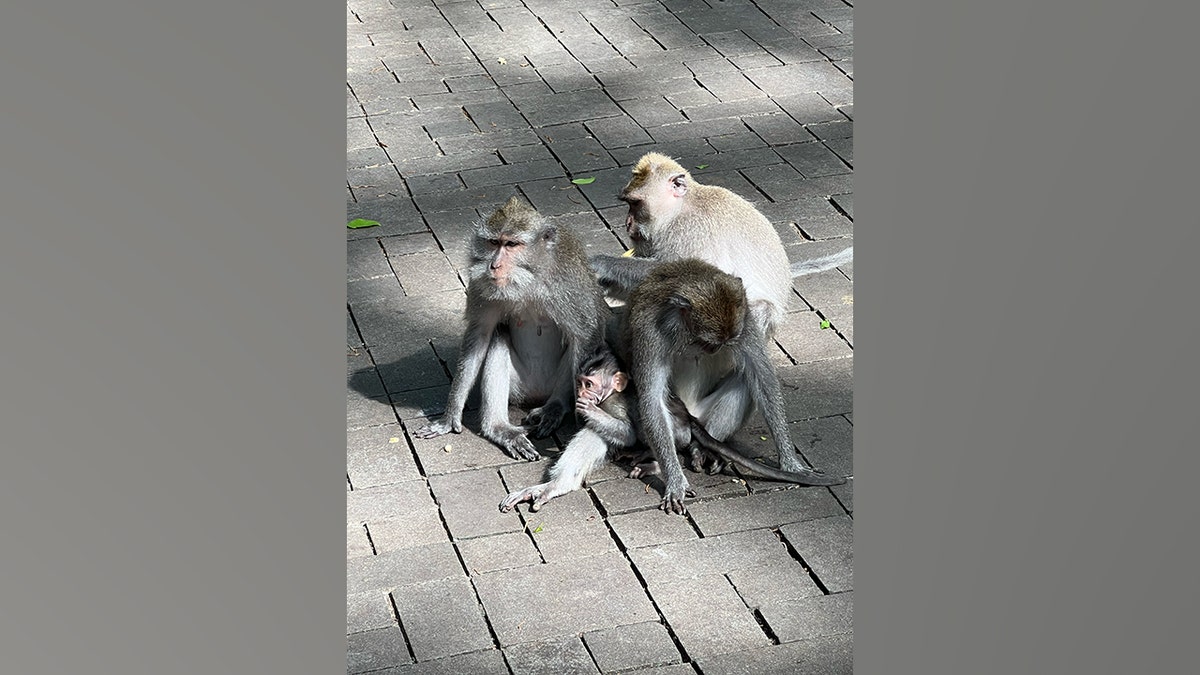
Monkeys are seen at Mandala Suci Wenara Wana, or Ubud Monkey Forest, in Bali, Indonesia. Around 600 monkeys live at Bali’s Uluwatu Temple, a Hindu temple that overlooks the Indian Ocean. (Fox News Digital)
«The monkeys have taken over the temple,» Jonathan Hammé, a London tourist whose sunglasses were stolen by a macaque, told the WSJ. «They’re running a scam.»
EXPERTS SOLVE MYSTERY OF ANCIENT ‘MUMMIFIED DRAGON’ DISCOVERED BY JAPANESE SHOGUN
Taylor Utley, a 36-year-old tourist from Kentucky, said a monkey stole her phone out of her hand while she was visiting Uluwatu Temple last year. To help get it back, a monkey handler had to repeatedly give the primate bags of fruit until it dropped Utley’s phone, the WSJ reported.
«I was taken aback,» Utley said. «It’s like a criminal enterprise of monkeys.»

A monkey is pictured stealing a food item at the popular Bingin Beach in Bali, Indonesia. At Uluwatu Temple, the monkeys reportedly steal dozens of items from tourists each week, including five to 10 smartphones every day. (Fox News Digital)
In an attempt to stop the thefts, Uluwatu Temple has implemented different feeding schedules for the monkeys and has offered them different food. However, it has not helped, according to the WSJ, citing Kadek Ari Astawa, who coordinates the monkey handlers.
Atsawa said he heard that when the temple first opened to visitors, tourists would sometimes feed the macaques. But once temple management restricted tourists from feeding them, the primates began stealing their belongings, the WSJ reported.
CLICK HERE TO GET THE FOX NEWS APP
In November, residents in a South Carolina town were advised to close their windows and doors after 43 rhesus macaque monkeys escaped a testing facility.
INTERNACIONAL
Daniel Noboa presentó una ley que impone ocho nuevas obligaciones a las ONG

El presidente Daniel Noboa envió a la Asamblea Nacional, con carácter de urgencia económica, el proyecto de Ley Orgánica para el Control de Flujos Irregulares de Capitales, una propuesta que impone al menos ocho nuevas obligaciones a las organizaciones no gubernamentales (ONG) y otras entidades sin fines de lucro, tanto nacionales como extranjeras.
La iniciativa ha encendido las alertas en múltiples sectores de la sociedad civil, que, si bien no se oponen a un marco que fomente la transparencia, advierten sobre la necesidad de mejorar los articulados del proyecto normativo.
Entre las obligaciones que establece el texto legal, se incluye el registro obligatorio en el Sistema Unificado de Información de las Organizaciones de la Sociedad Civil (SUIOS) y, en caso de recibir fondos del extranjero, también en la Unidad de Análisis Financiero y Económico (UAFE). Además, se dispone la supervisión directa por parte de la Superintendencia de Economía Popular y Solidaria (SEPS), bajo normativas propias del sistema financiero y societario.

Las organizaciones deberán implementar sistemas internos de integridad que incluyan códigos de ética, políticas anticorrupción y la designación de responsables de cumplimiento. También deberán presentar informes públicos anuales detallados, con información sobre ingresos, egresos, beneficiarios, impactos y riesgos.
Se exige la aplicación de procedimientos de debida diligencia para identificar donantes y beneficiarios, incluso en operaciones pequeñas, así como el establecimiento de auditorías internas y externas periódicas. Aunque se plantea una vigilancia diferenciada basada en riesgo, el texto no detalla cómo se definirá dicho riesgo. También se prevén sanciones severas, como multas, suspensión de actividades o incluso la disolución de las organizaciones por incumplimientos administrativos.
Uno de los aspectos más criticados es que la SEPS —una entidad concebida para supervisar cooperativas y entidades del sector financiero popular— asuma el control de miles de organizaciones sociales y comunitarias, lo cual resulta desproporcionado según diversos análisis técnicos.
Según cifras citadas en la exposición de motivos del proyecto, seis de cada diez organizaciones no tienen presupuesto definido y solo una de cada diez supera los USD 100 mil anuales. A pesar de ello, la normativa plantea las mismas exigencias de cumplimiento para todas.

En un comunicado suscrito por nueve organizaciones, entre ellas Fundamedios, la Fundación Ecuatoriana Equidad y la Coalición Nacional de Mujeres del Ecuador, se expresa el respaldo a una legislación que refuerce la integridad y evite el uso de estructuras asociativas para actividades delictivas. Sin embargo, se insiste en que la ley debe incorporar un enfoque diferenciado, escalonado y razonable, que no imponga cargas técnicas o financieras inalcanzables para organizaciones pequeñas, comunitarias o de base.
También se propone establecer espacios de diálogo institucional con las ONG, programas de capacitación y medidas de fortalecimiento institucional en lugar de medidas únicamente punitivas.
El malestar de la sociedad civil no se limita al contenido técnico del proyecto, sino también al discurso con el que el Ejecutivo lo ha promovido. El lunes 28 de julio, el presidente Noboa afirmó: “En el Ecuador se usan fundaciones u organizaciones sin fines de lucro, ONGs internacionales, para ingresar dinero y desestabilizar el país sin ningún tipo de control de la UAFE, sin ningún tipo de control financiero”.

A esto se sumó la jefa del bloque oficialista, Valentina Centeno, quien aseguró que “muchas de las fundaciones son vehículos para financiar grupos de delincuencia organizada, minería ilegal o paralizaciones violentas contra el gobierno y el Estado”. Ninguna de estas acusaciones, sin embargo, se encuentra respaldada por evidencia empírica en el texto del proyecto de ley ni por informes oficiales disponibles.
La narrativa oficial, según expertos, puede fomentar estigmatización y desconfianza hacia organizaciones que ejercen roles legítimos de crítica, defensa de derechos o acción humanitaria.
Diversas voces advierten que el proyecto amenaza con reducir el espacio cívico en Ecuador. Al imponer condiciones similares a las de sujetos obligados financieros, se corre el riesgo de ahogar la operatividad de organizaciones pequeñas. Además, la posibilidad de disolución administrativa por incumplimientos formales —sin mediación judicial— podría facilitar abusos de poder.
El proyecto tampoco contempla mecanismos de acompañamiento técnico, ni establece una evaluación de riesgos sectorial como recomiendan los estándares internacionales del Grupo de Acción Financiera Internacional (GAFI), que advierten contra la sobrerregulación indiscriminada. Por el contrario, el GAFI insiste en que solo debe aplicarse control estricto sobre organizaciones identificadas previamente como de alto riesgo.
La Asamblea Nacional ha confirmado que recibió el proyecto y que será tratado en lo siguientes 30 días.
South America / Central America,Government / Politics,QUITO
INTERNACIONAL
Trump, Republicans race to redraw Texas congressional map as Democrats threaten legal war

Texas redistricting hearing descends into chaos
Isaiah Martin, a Democrat who is running for the 18th congressional district in Houston, had to be restrained and removed from Thursday’s House committee hearing on redistricting after exceeding his time to testify. (Isaiah Martin via Storyful)
NEWYou can now listen to Fox News articles!
President Donald Trump and Republicans are moving full speed ahead in an extraordinary push to redraw congressional district maps ahead of next year’s midterm elections, when the GOP will be defending its razor-thin House majority.
And Democrats are trying to fight back against the Republicans’ controversial moves.
Texas GOP state lawmakers will unveil their proposed new congressional redistricting maps as early as Wednesday, a well-connected Republican source in the Lone Star State confirmed to Fox News Digital.
Meanwhile, the top Democrat in the House is expected to travel to Texas to meet Wednesday evening with Democrats in the state legislature at a meeting in Austin.
TEXAS DEMOCRATIC LAWMAKERS PREPARING TO FLEE RED STATE TO BLUNT GOP CONGRESSIONAL REDISTRICTING PUSH
Republican state lawmakers in the Texas legislature could unveil proposed new congressional redistricting maps as early as Wednesday. (Brandon Bell/Getty Images)
House Minority Leader Hakeem Jeffries has accused the Republicans of being «afraid of the voters in 2026 in the midterm elections and they’re trying to cheat to win.»
The Republican push in Texas is part of a broader effort by the GOP across the country to keep control of the House, and cushion losses elsewhere in the country, as the party in power traditionally faces political headwinds and loses seats in midterm elections.
TEXAS GOV SAYS DEMS WHO ‘FLED’ STATE OVER ELECTIONS BILL WILL BE ARRESTED UPON RETURN
Trump and his political team are aiming to prevent what happened during his first term in the White House, when Democrats stormed back to grab the House majority in the 2018 midterms.
«Texas will be the biggest one,» the president told reporters recently, as he predicted the number of GOP-friendly seats that could be added through redistricting in the reliably red state. «Just a simple redrawing, we pick up five seats.»
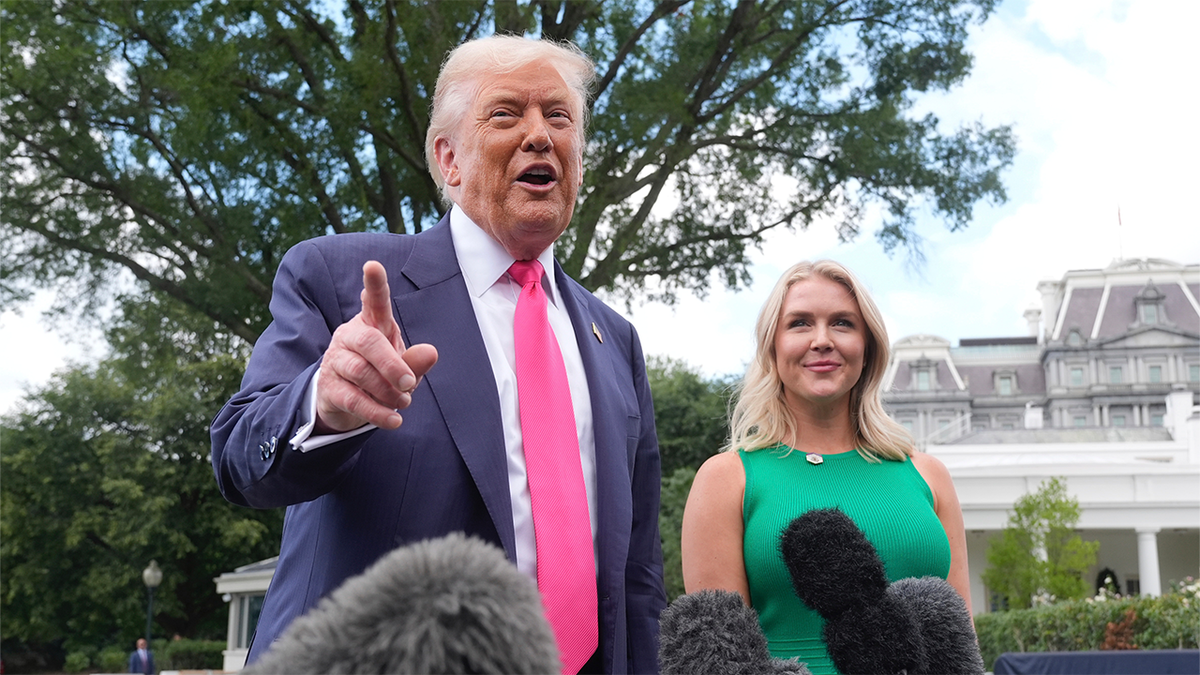
President Donald Trump, accompanied by White House press secretary Karoline Leavitt, speaks to reporters as he departs the White House, on July 15, 2025. (AP)
Democrats control just 12 of the state’s 38 congressional districts, with a blue-leaning seat vacant after the death in March of Rep. Sylvester Turner.
The GOP idea is to relocate Democratic voters from competitive seats into nearby GOP-leaning districts, and move Republican voters into neighboring districts the Democrats currently control.
Gov. Greg Abbott and Lt. Gov. Dan Patrick, both conservative Republicans and Trump allies, said they needed to redistrict because of constitutional concerns raised by the Justice Department over a handful of minority-dominated districts.
COURT SIDETRACKS REDISTRICTING FIGHT IN KEY BATTLEGROUND STATE
But the move is potentially risky.
«There is some risk of making safe Republican seats more competitive, and I think that the incumbents are certainly worried about that,» veteran Texas-based Republican strategist Brendan Steinhauser recently told Fox News. «If you talk to Republican members of Congress, they’re going to be worried about their own seats. They don’t want to be in a seat that’s more competitive.»
Steinhauser noted «that’s the tradeoff for Republicans, if you want to grow the majority.»
But he added that «the people drawing the maps… they don’t want to make any seat too competitive because that will defeat the purpose.»
Redistricting typically takes place at the start of each decade, based on the latest U.S. Census data. Mid-decade redistricting is uncommon—but not without precedent.
Democrats are slamming Trump and Texas Republicans for what they describe as a power grab, and vowing to take legal action to prevent any shift in the current congressional maps.
And Democrats in blue-dominated states are now trying to fight fire with fire.
«Two can play this game,» California Gov. Gavin Newsom wrote on social media recently.
The next day, after a meeting, Democrats in California’s congressional delegation said they were on board with an ambitious plan to try and gain at least five seats through redistricting. Democrats currently control 43 of the Golden State’s 52 congressional districts.
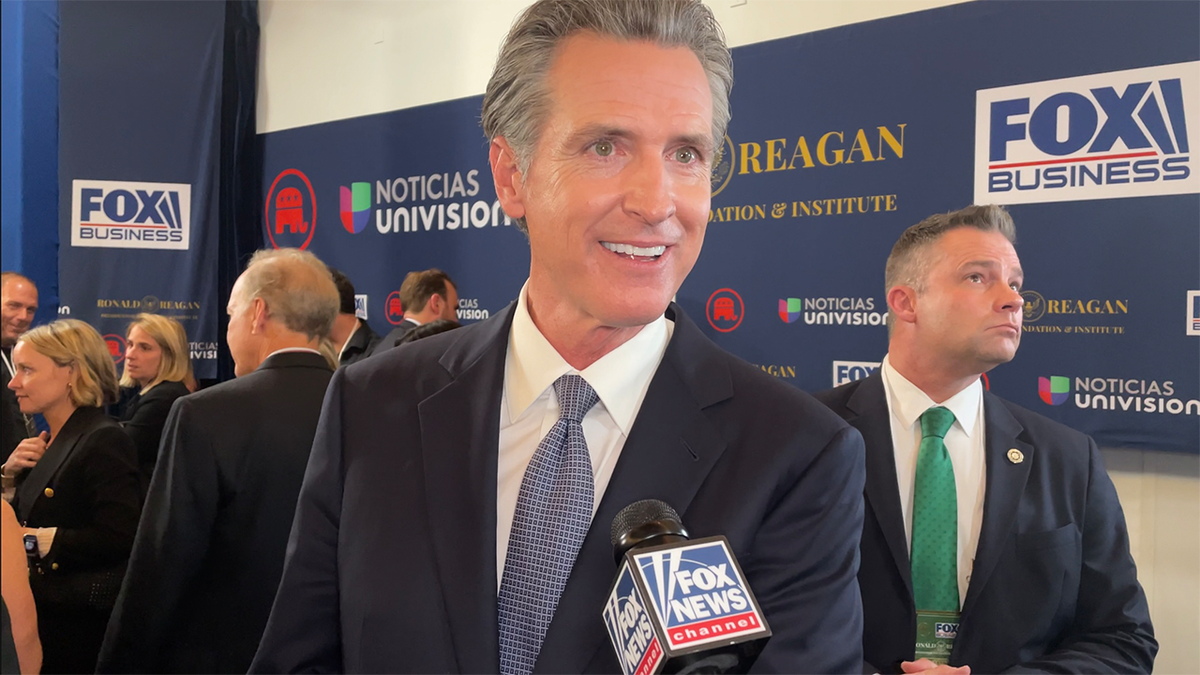
Democratic Gov. Gavin Newsom of California is considering launching a redistricting push in his blue state to counter Republican efforts underway in red-state Texas. (Paul Steinhauser – Fox News )
Jeffries, after his two-day stop in Texas, heads to California for meetings with state Democrats.
But it won’t be easy to enact the change, because in California, congressional maps are drawn by an independent commission that is not supposed to let partisanship influence their work.
Newsom has suggested that the state’s Democratic-controlled legislature move forward with a mid-decade redrawing of the maps, arguing that it might not be forbidden by the 17-year-old ballot initiative that created the independent commission.
The governor also proposed quickly holding a special election to repeal the commission ahead of the 2026 midterm elections.
Both plans are considered long shots, as they would face plenty of legislative, legal and financial hurdles.
Democrats in other heavily populated blue states—including New York, Illinois, and New Jersey, are also considering making changes to their maps, but have redistricting limits enshrined in their state constitutions.
CLICK HERE TO GET THE FOX NEWS APP
Meanwhile, Ohio is required by law to redistrict this year, and a redrawing of the maps in the red-leaning state could provide the GOP with up to three more congressional seats.
And Republicans are also mulling mid-decade redistricting that might give the GOP a couple of more House seats in red states such as Florida, Missouri, and Indiana.
INTERNACIONAL
Trump says Ukrainians can stay in US following months of uncertainty

NEWYou can now listen to Fox News articles!
President Donald Trump has said he will likely allow Ukrainians who have fled the war with Russia to remain in the U.S., ending months of uncertainty over whether they would be forced to leave.
«I think we will, yeah, I do, I think we will,» Trump said Tuesday evening from the White House in response to a question by reporters regarding whether he will allow Ukrainians to remain in the U.S. until the war ends.
«We have a lot of people that came in from Ukraine, and we’re working with them,» he added.
President Donald Trump speaks to the press near the Rose Garden after returning to the White House on July 29, 2025, in Washington D.C. (MEHMET ESER/Middle East Images/AFP via Getty Images)
TRUMP ISSUES FIRM 10-DAY DEADLINE TO PUTIN TO END WAR
Concern over the temporary protected status (TPS) afforded to roughly 240,000 Ukrainians who fled the war to the U.S. under the government program known as Uniting for Ukraine (U4U), first implemented in April 2022, has been heightened since the first day that Trump entered office in January when he issued the executive order titled «Securing our Borders.»
Eight days later, on Jan. 28, the Department of Homeland Security (DHS) confirmed that the order had paused the government program, barring additional Ukrainians from entering the U.S. under those protections.
However, even as TPS remained in place for Ukrainians already stateside, concern remained high amid reports in March that the president was considering the removal of this protection status.
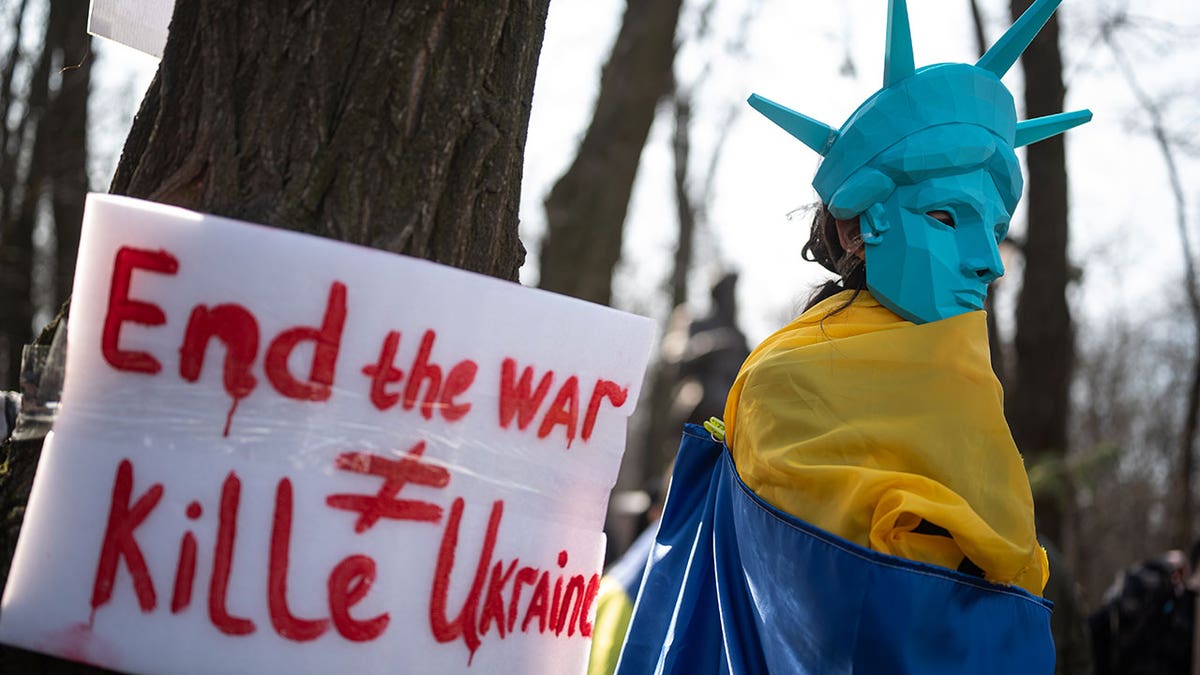
A person wears a mask symbolizing the Statue of Liberty as Ukrainians, holding banners and flags, hold a rally in front of the U.S. Embassy to protest the actions of the Trump administration considering the ongoing Russia-Ukraine war, on March 8, 2025 in Kyiv, Ukraine. (Danylo Antoniuk/Anadolu via Getty Images)
MEDVEDEV WARNS TRUMP’S NEW DEADLINE TO END RUSSIA-UKRAINE CONFLICT IS A ‘STEP TOWARDS WAR’
White House press secretary Karoline Leavitt responded to the reporting by Reuters and called it «fake news» before adding «no decision has been made at this time.»
However, when asked about the reporting later that day, Trump said, «We’re certainly not looking to hurt them.
«And I’m looking at that, and there were some people that think that’s appropriate, and some people don’t, and I’ll be making a decision pretty soon,» he added.
Confusion remained after DHS in April reportedly distributed an email to some Ukrainians under the TPS program notifying them that their status had been revoked, and they would need to leave the country within seven days.
DHS later confirmed this was sent in error, but the mistake highlighted the uncertainty that persisted for months.
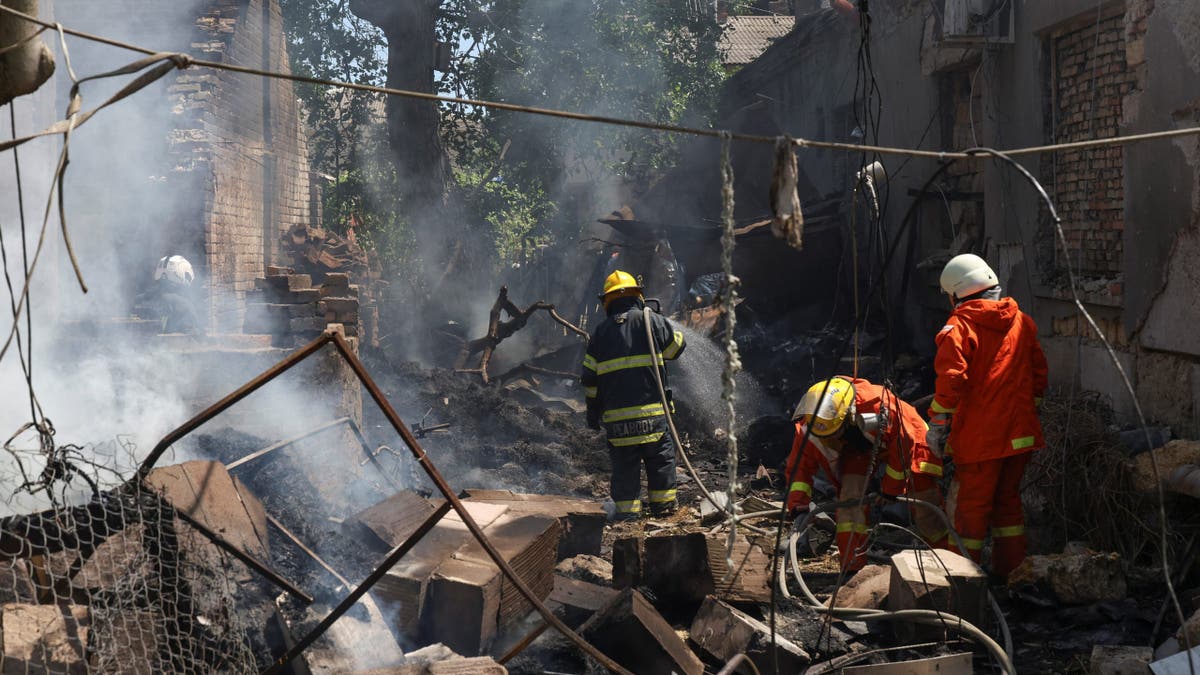
Firefighters work at the site of horse stalls heavily damaged by a Russian drone strike amid Russia’s attack on Ukraine, in Odesa, Ukraine, on July 11, 2025. (Reuters/Nina Liashonok)
CLICK HERE TO GET THE FOX NEWS APP
The latest assurances by Trump come as he has grown increasingly frustrated with Russian President Vladimir Putin’s continued attacks on civilian populations in Ukraine despite U.S. attempts to forge a ceasefire.
Trump on Tuesday also announced that Putin has 10 days to enter into some sort of peace deal with Ukraine or face secondary sanctions on its chief commodity – oil.
Neither the White House nor DHS immediately responded to Fox News Digital’s questions regarding the president’s recent announcement, and it remains unclear if the U4U program could also be reopened to other Ukrainian citizens as the war continues.

 POLITICA2 días ago
POLITICA2 días agoLa confianza en el gobierno de Javier Milei creció un 4,9% en el mes de julio

 POLITICA2 días ago
POLITICA2 días ago“Tiene que ser nuestro próximo presidente”: el video con el que Javier Milei recordó a la Locomotora Olivera

 SOCIEDAD2 días ago
SOCIEDAD2 días agoTurismo: el megacomplejo con una atracción icónica que será un giro innovador en la expansión del sur de Mar del Plata






















